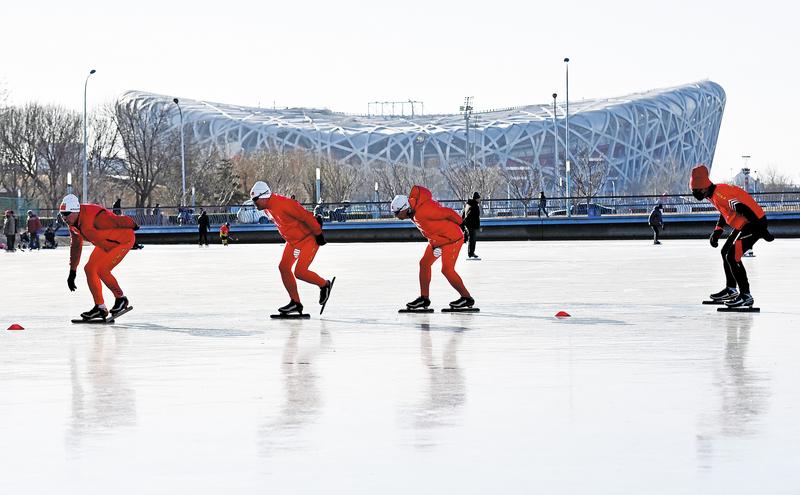 Skaters practice on the lake at Olympic Forest Park in Beijing. (WEI XIAOHAO / CHINA DAILY)
Skaters practice on the lake at Olympic Forest Park in Beijing. (WEI XIAOHAO / CHINA DAILY)
Faced with the challenges posed by the COVID-19 pandemic, Beijing is determined to give the world green, sharing, open and clean Winter Olympics in less than a month, after years of preparation.
Local residents, athletes, actors, office workers and children were among those who gathered in the city on Dec 26 to celebrate the start of the 40-day countdown to the Winter Games, which are scheduled to open on Feb 4.
The participants sang, painted, played ice games and cut a cake at the event in Beijing’s Shijingshan district, where production of a documentary about China’s winter sports development was also announced.
At a crucial time, with numerous countries still severely affected by the pandemic, Beijing will become the first city in the world to host both the Summer and Winter Olympics.
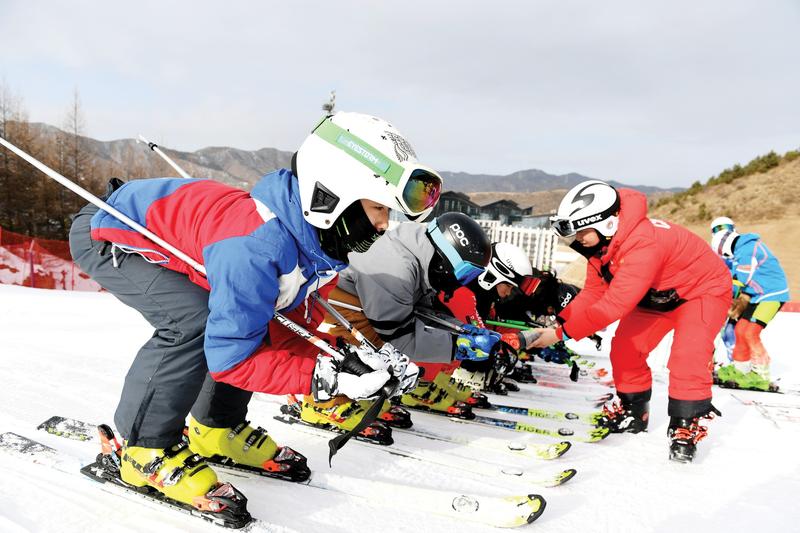 Students from a middle school in Zhangjiakou, Hebei province, attend a ski training course. (CHEN XIAODONG / FOR CHINA DAILY)
Students from a middle school in Zhangjiakou, Hebei province, attend a ski training course. (CHEN XIAODONG / FOR CHINA DAILY)
The most important task for the Chinese capital was to build professional and high-quality venues for the Winter Games. The municipal authorities not only built these venues on time, but also incorporated Chinese cultural elements, sustainable concepts and advanced technology.
Work on all competition venues in the city has been completed, and artificial snow is being produced for the Games at many of these sites.
Following a sustainable development concept, 11 of the 13 venues for the Games in Beijing were used for the Summer Olympics in 2008.
According to the Beijing Institute of Architectural Design (Group) Co, which was responsible for the design work for the Winter Games venues, those in the city being used for ice events can be adapted to stage summer sports.
The Wukesong Sports Center is one of the 2008 Summer Games venues being used — along with the Bird’s Nest stadium, also known as the National Stadium, which will stage the opening and closing ceremonies for the Winter Olympics. The Water Cube — the National Aquatics Center — will host curling, while ice hockey will be staged at the National Indoor Stadium.
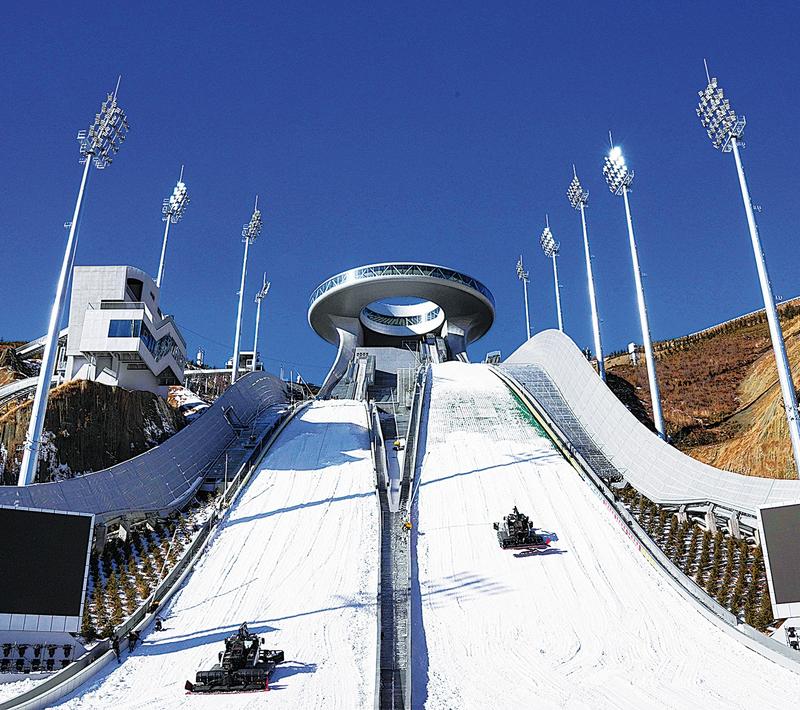 The ski jump in Zhangjiakou. (YANG SHIYAO / XINHUA)
The ski jump in Zhangjiakou. (YANG SHIYAO / XINHUA)
Capital Indoor Stadium, an older venue that was renovated for the 2008 Olympics, will host figure skating and short track events.
The Water Cube, which hosted swimming and diving during the 2008 Games, has been transformed into an “ice cube” for the Winter Olympics curling events. Decoration and renovation work at the venue included filling the main pool with removable and reusable steel structures.
Zheng Fang, chief designer for the renovation project, said the Water Cube has been given a smart upgrade. The display system uses 5G technology, providing additional details of the Games and enabling instant interaction with spectators during events.
The lighting system is also smart, while a green construction concept was adopted, in line with the nation’s aim to reduce carbon emissions.
The only new outdoor venue in Beijing for snow sports is Big Air Shougang, located at Shougang Industrial Park in the western district of Shijingshan. The site features a steep, twisting ramp, which will remain in place after the Games.
Four Winter Olympics gold medals — two for snowboarding and two for freestyle skiing — will be decided at this venue.
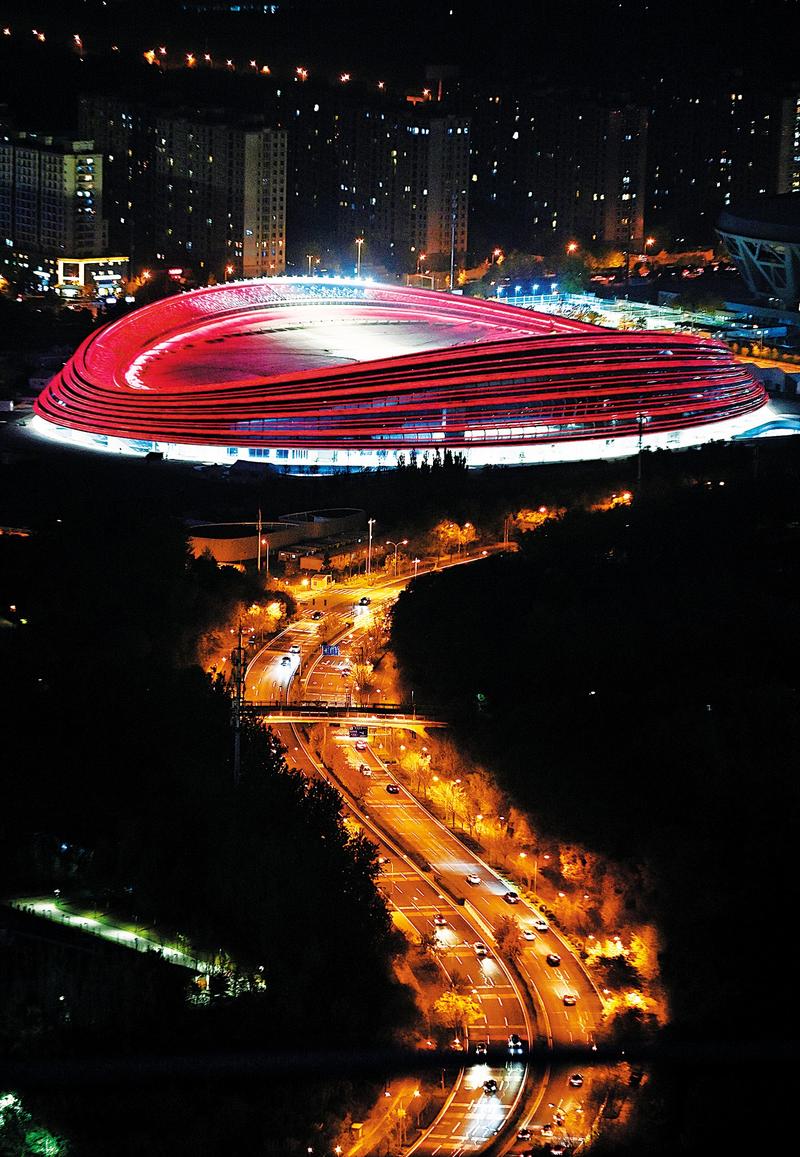 The National Speed Skating Oval at night. (WEI XIAOHAO / CHINA DAILY)
The National Speed Skating Oval at night. (WEI XIAOHAO / CHINA DAILY)
Inspired by the Flying Apsaras fresco at the Mogao Grottoes in Gansu province, the ramp was designed to resemble a ribbon floating in the air.
Zhang Li, chief architect for Big Air Shougang and dean of the School of Architecture at Tsinghua University, said transformation of the industrial park, which was used to house a steel factory, centered on a cultural, sporting and leisure theme.
“Building a permanent Olympic venue at the park is the perfect expression of this theme,” he said in an interview with China Central Television. “The sports it will host feature speed, light and freedom, and we’ve incorporated these factors in the ribbon design.”
The 2008 Summer Olympics paved the way for Beijing to experience top-level international sports competitions and also changed many people’s career paths.
Huang Zhenxiang, who worked as a volunteer during the Summer Games that year, is now volunteer manager at the National Snowmobile and Sled Center in Beijing.
“I was in middle school in 2001, when China won the right to host the 2008 Olympics. I saw people in Beijing celebrating this achievement in the streets,” he said.
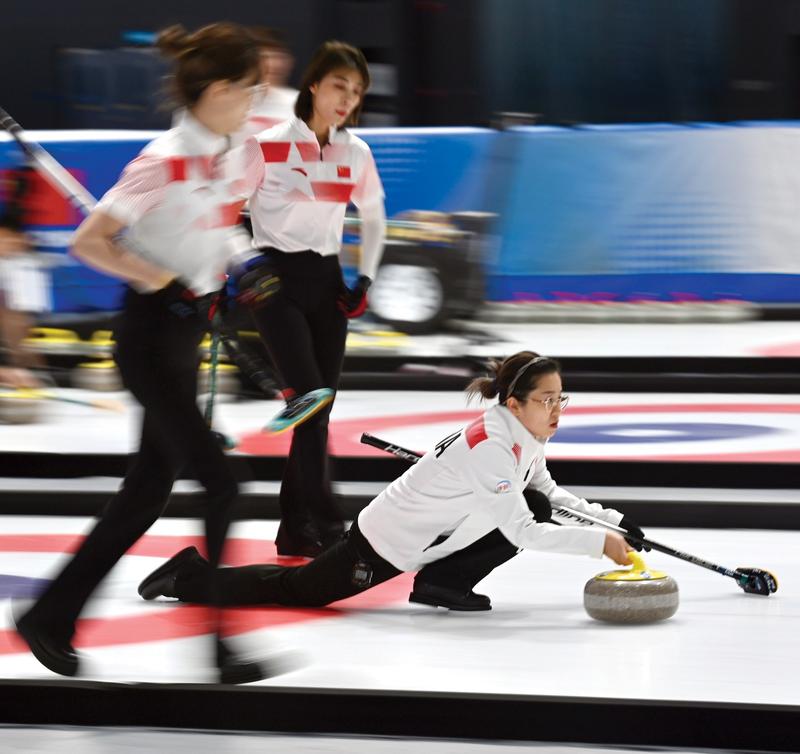 Athletes compete in a qualification round for curling at the Winter Olympics. (WEI XIAOHAO / CHINA DAILY)
Athletes compete in a qualification round for curling at the Winter Olympics. (WEI XIAOHAO / CHINA DAILY)
In 2008, when he was a university student in Beijing, Huang worked as a volunteer at the Summer Games. He has been involved with volunteer service ever since and said the 2008 Games changed the course of his life.
Zhang Xiaodan, who helped design Olympic venues used in 2008 after he had just graduated from college, is working as deputy competition service manager at the National Speed Skating Oval during the Winter Games.
“Few international sporting events were held in China before 2008, but in the past decade, the nation has hosted many, creating increased demand for related talent. Lots of young people who worked for the 2008 Games are now leaders in different sectors,” he said.
During the Winter Games, a new group of young volunteers will start their learning process, which may point the way to their futures.
According to the municipal government, up to 200,000 volunteers will work at the Games, starting from Jan 25. They will help provide information, language services, emergency aid, and support for people with disabilities.
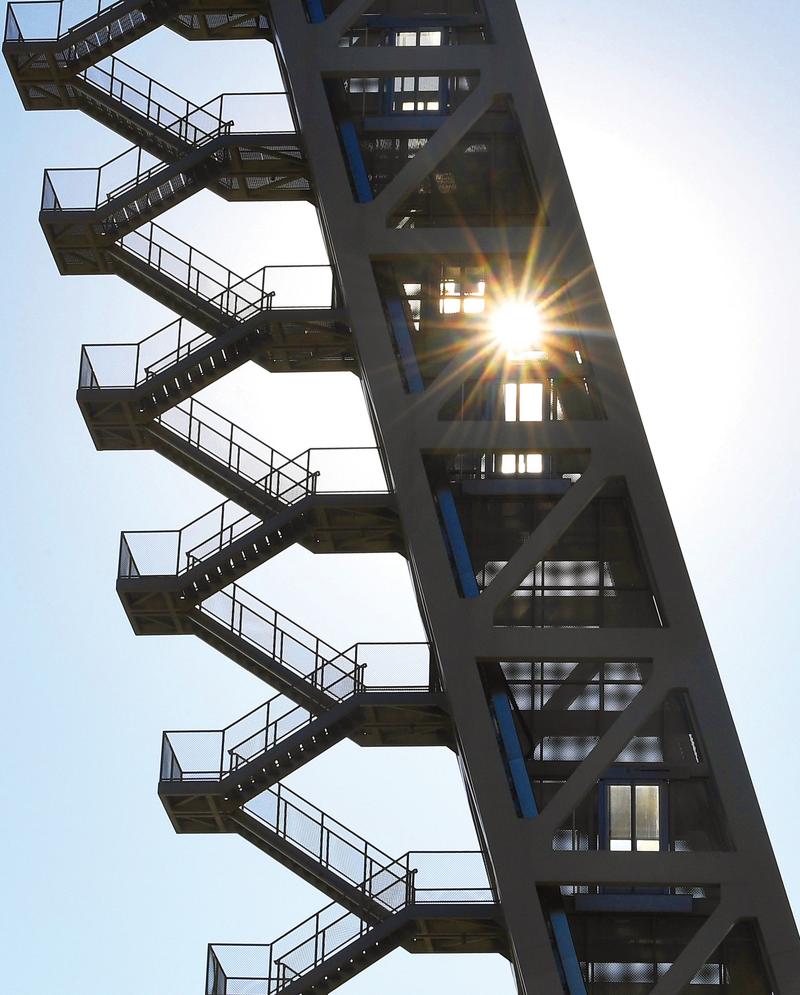 An elevator to the ski jump at Shougang Industrial Park in western Beijing. (LI HE / XINHUA)
An elevator to the ski jump at Shougang Industrial Park in western Beijing. (LI HE / XINHUA)
Li Jian, deputy head of the volunteer headquarters, said at a news conference that the workers have received professional training, and that authorities will ensure their safety under strict pandemic control and prevention rules.
The Beijing government has introduced stringent measures to prevent the risk of infection during the Games, with the aim of holding a safe Olympics for everyone.
Shen Xue, a former Olympic champion figure skater, said during the 40-day countdown event that since China won the bid to host the Winter Olympics in Beijing and Zhangjiakou, Hebei province, ice and snow sports have developed rapidly in the nation.
“All the ice venues will become precious Olympic legacies for Beijing and China, helping the country become a strong force in winter sports,” she said.
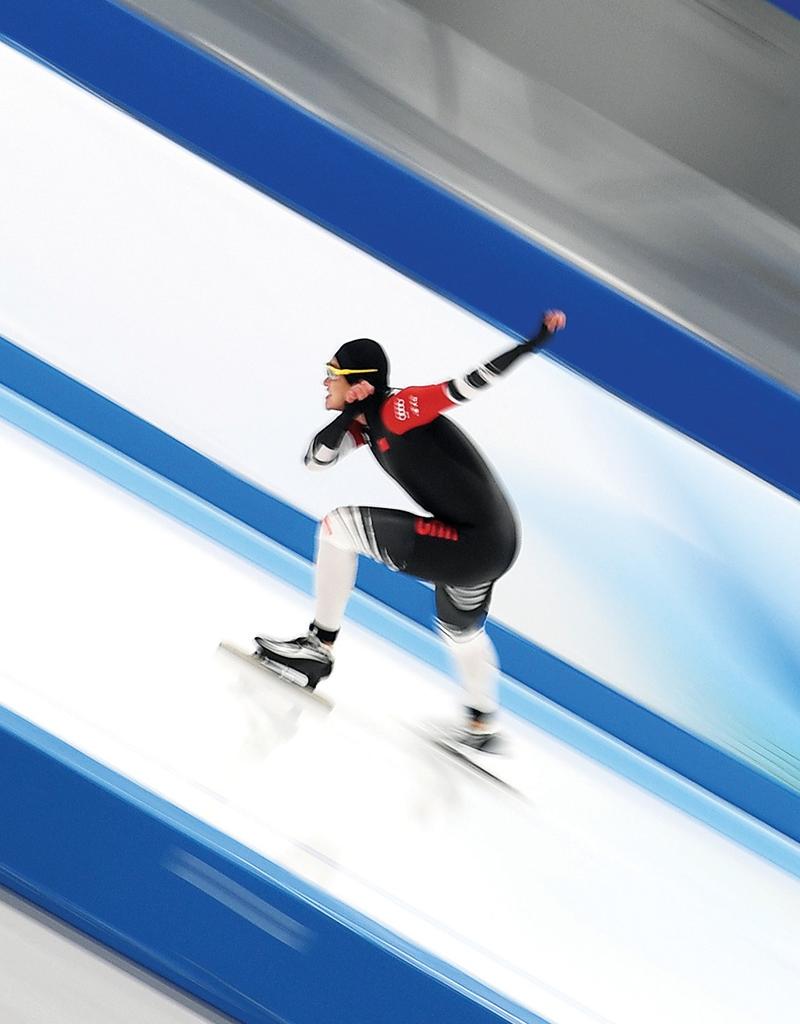 A speed skater takes part in a trial event in Beijing. (WEI XIAOHAO / CHINA DAILY)
A speed skater takes part in a trial event in Beijing. (WEI XIAOHAO / CHINA DAILY)
Zhang Weili, an enthusiastic skier from Fengtai district in Beijing, said he has witnessed the fast development of the ice sports industry in recent years.
“More people have started to take up ice events, as enthusiasm for winter sports grows in the city. I’m so happy to see increasing numbers having fun as they enjoy these seasonal activities,” he said.
The Beijing resident, who has been skiing for more than 10 years, said he often visits Big Air Shougang, where many ice-themed activities take place.
“I hope all the athletes will achieve their dreams at the upcoming Games,” he said.
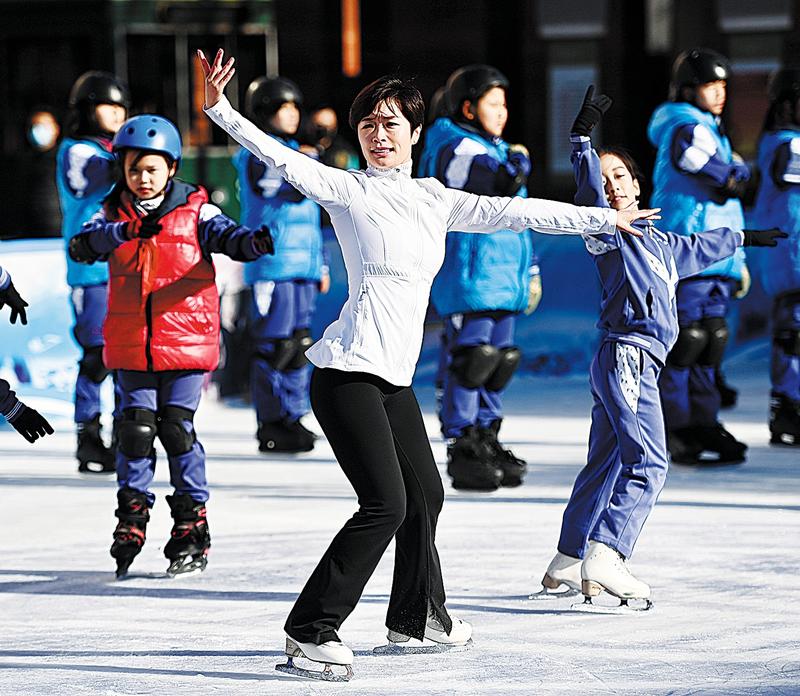 Fang Dan, a national figure skating champion, joins a primary school activity in Beijing. (WEI XIAOHAO / CHINA DAILY)
Fang Dan, a national figure skating champion, joins a primary school activity in Beijing. (WEI XIAOHAO / CHINA DAILY)
In the past seven years, Beijing and Hebei have stepped up integrated development during their preparations for the Winter Olympics. Infrastructure in Zhangjiakou has been significantly upgraded, including transportation services, water, power and natural gas.
The two cities have also been successful in jointly tackling air pollution.
As Zhangjiakou now boasts three additional resorts, skiing enthusiasts routinely use high-speed rail services to reach these facilities.
Liu Shanshan, 36, who loves to ski, said the forthcoming Games have brought the two cities, people and winter sports closer.



